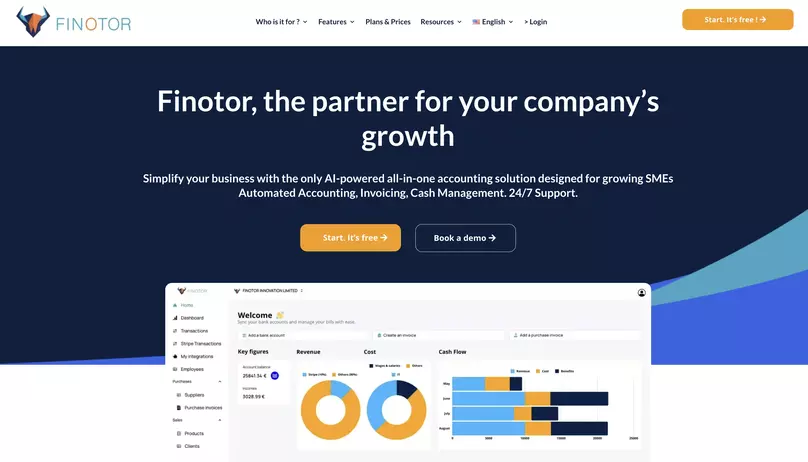Contents
Artificial intelligence (AI) is no longer the future; it is reshaping the present across every industry, including e-commerce, finance, and beyond. Despite its pervasive influence, many businesses are still grappling with the basic question: How can AI drive real value for us?
This article explores how AI is revolutionizing business models, streamlining operations, and enhancing decision-making processes. We will also delve into how tools like Finotor can help manage the financial complexities that come with integrating new technologies.
The Rise of AI in Business
✅ Understanding Generative AI
Generative AI represents a significant leap in the capabilities of artificial intelligence systems. It’s a subset of AI technologies that utilizes machine learning models to generate new content—be it text, images, or even executable code—based on patterns and information extracted from vast amounts of existing data. Unlike traditional AI applications which typically automate tasks, generative AI goes a step further by not only mimicking but also enhancing human creativity and decision-making processes.
This form of AI leverages deep learning techniques, particularly neural networks, to analyze and learn from data, then apply this knowledge to generate original output. This ability to create and innovate makes generative AI a powerful tool for a variety of applications.
For instance, in the media industry, it can produce creative and novel written content or artwork that might take a human artist considerable time to develop. In software development, generative AI can write code snippets or even entire programs based on the requirements fed into the system, drastically reducing development time and potentially increasing the quality of the code.
✅ Key Players and Innovations
OpenAI: Several pioneering companies have pushed the boundaries of what’s possible with generative AI. OpenAI, a leader in the field, has developed various iterations of their GPT (Generative Pre-trained Transformer) models. These LLMs (large language models) are capable of generating human-like text that can converse, answer questions, and even write persuasive essays. These capabilities have vast implications for content creation across sectors, from automating customer service interactions to creating personalized content in marketing campaigns.
Vimeo: On the other hand, has integrated AI into its video production tools to simplify and enhance the video creation process. Vimeo and their AI-driven solutions help in scene recognition, video editing, and optimization of video content for various platforms, which streamlines the production process and makes high-quality video content more accessible to creators at all levels. This not only saves time and resources but also democratizes high-quality production capabilities, allowing individual creators and small firms to produce content that stands shoulder to shoulder with outputs from larger studios.
Adobe and Autodesk: Furthermore, these companies are integrating AI into their software to aid in design and creative processes. Adobe, for instance, has enhanced its products with AI that can do everything from refining images to crafting complex digital paintings, helping creatives transcend traditional boundaries of graphic design and digital artistry.
The advancements in generative AI are not just transforming how tasks are performed but are reshaping entire industries. By automating complex and creative processes, AI is not only increasing efficiency but is also opening up new possibilities for innovation and creativity. As these technologies become more refined and accessible, they will continue to drive significant changes in the way businesses operate, delivering more personalized and engaging experiences to their customers and creating new value across the digital economy.
Transforming Business Strategies with AI
✅ Enhancing Productivity
In today’s competitive business landscape, leveraging AI to enhance productivity is becoming increasingly essential. AI tools are adept at handling a wide range of routine and repetitive tasks across various sectors. For example, in the administrative domain, AI can automate tasks such as data entry, appointment scheduling, and email sorting. This automation extends into more complex areas like customer relationship management, where AI systems can track interactions, analyze customer feedback, and even predict customer behaviors with high accuracy.
The integration of AI into these areas significantly boosts productivity by streamlining processes that traditionally required extensive human effort. For instance, AI-driven analytics platforms can process and analyze large volumes of data in real time, providing businesses with actionable insights much faster than humanly possible. This rapid processing capability allows companies to respond more swiftly to market changes, adjust strategies on the fly, and maintain competitive advantages.
Moreover, by automating mundane tasks, companies not only optimize their workflows but also enhance employee satisfaction. Employees are freed from tedious, repetitive tasks and can instead focus on higher-level, strategic work that is more fulfilling and better utilizes their skills. This shift can lead to increased job satisfaction, lower turnover rates, and a more motivated workforce, contributing to an overall more positive company culture.
✅ Driving Innovation
AI’s real strength lies in its ability to sift through and analyze massive datasets—far beyond the capacity of human analysts—unearthing valuable insights that can propel innovation across all facets of a business. In product development, AI can identify emerging trends and consumer preferences by analyzing social media data, online reviews, and other customer interactions. This analysis can inform the development of new products or enhancements to existing ones, ensuring they more closely align with current market demands.
In marketing, AI tools can transform strategies by enabling hyper-personalized campaigns. AI algorithms analyze customer data to understand purchasing behaviors and preferences, which can then be used to tailor marketing messages to individual consumers. Such targeted marketing not only improves customer engagement but also increases the effectiveness of marketing spend by reducing waste on poorly targeted efforts.
Customer service is another area where AI is making a significant impact. Chatbots and virtual assistants powered by AI can handle a large volume of customer queries without human intervention. These tools learn from each interaction and progressively provide more accurate and helpful responses. For businesses, this means extended customer service hours and quicker response times, enhancing customer satisfaction and loyalty.
Furthermore, AI can also drive innovation in operational processes. For example, predictive maintenance, powered by AI, can foresee potential equipment failures before they occur by analyzing data from sensors and machine usage. This proactive approach prevents downtime, reduces maintenance costs, and extends the life of equipment.
In conclusion, AI’s role in transforming business strategies is profound and multi-faceted. By enhancing productivity and driving innovation, AI not only streamlines existing processes but also opens new avenues for growth and development. As businesses continue to adopt AI technologies, they will find themselves better equipped to meet the challenges of the modern market, offering improved products and services that meet the heightened expectations of their customers.
✅ Risk Management
Identifying Patterns and Predicting Failures
One of the most critical applications of AI in modern business practices is in the domain of risk management. AI systems excel at identifying complex patterns and anomalies that would be nearly impossible for humans to detect without extensive data analysis. By leveraging machine learning algorithms and deep learning networks, AI can sift through massive datasets quickly and efficiently, identifying potential risks that could lead to system failures or operational disruptions.
Machinery and Equipment Failures
In industries reliant on heavy machinery and equipment, such as manufacturing, construction, and transportation, downtime can be incredibly costly. AI-driven predictive maintenance tools analyze data from various sensors embedded in equipment to monitor performance and condition in real-time. These tools can predict when a piece of equipment is likely to fail, allowing for maintenance to be scheduled at convenient times without disrupting normal operations. This proactive approach not only reduces the costs associated with equipment downtime but also extends the lifespan of the machinery, thereby optimizing capital investments.
Financial Risk Assessment
In the financial sector, AI plays a pivotal role in identifying risks in investment portfolios and market movements. AI systems analyze historical data and current market conditions to identify potential financial risks, such as credit risks, liquidity risks, and market-based risks. By predicting these risks, AI enables financial institutions to take preventative measures, such as adjusting their investment strategies or hedging against potential losses. This proactive management can protect the financial health of the organization and its clients, maintaining investor confidence and compliance with regulatory requirements.
Cybersecurity Threats
With cyber threats becoming more sophisticated, AI has become an indispensable ally in cybersecurity. AI systems can monitor network traffic and analyze patterns to detect anomalies that may indicate a cyber attack, such as data breaches, phishing attempts, or ransomware. By identifying these threats early, AI enables companies to implement defensive strategies promptly, significantly reducing potential damage. Moreover, AI-driven security systems learn continuously from new data, which helps them to stay updated with the latest threat tactics and enhances their effectiveness over time.
Impact on Business Continuity and Reputation
The ability of AI to manage risks proactively has a profound impact on business continuity. By anticipating and mitigating risks before they escalate into more significant issues, companies can maintain operational stability and ensure that their business processes run smoothly. This stability is crucial not only for the financial bottom line but also for maintaining customer trust and satisfaction.
Moreover, effective risk management is vital for protecting a company’s reputation. In today’s digital age, a single failure can lead to significant reputational damage that can be costly to repair. By using AI to manage risks effectively, companies can avoid many of the pitfalls that might lead to public relations crises or customer dissatisfaction.
In summary, AI’s role in risk management is transforming how companies approach potential threats across various domains, from machinery maintenance to financial investments and cybersecurity. This not only safeguards the company’s resources and reputation but also provides a competitive edge by ensuring the business can adapt to and mitigate risks swiftly and efficiently.
Case Studies: Real-world Applications of AI
✅ E-commerce Optimization
The e-commerce industry has seen remarkable transformations thanks to AI technologies, which have significantly enhanced both operational efficiency and customer experience.
Inventory Management
One of the most significant impacts of AI in e-commerce is on inventory management. AI systems utilize predictive analytics to forecast product demand based on various factors such as seasonal trends, historical sales data, and consumer behavior patterns. This allows retailers to optimize their stock levels, reducing both overstock and stockouts, thereby minimizing warehousing costs and maximizing sales opportunities.
Customer Interaction
AI has also revolutionized customer interaction on e-commerce platforms. AI-driven chatbots are now a common feature on many websites, providing 24/7 customer service without the need for human intervention. These chatbots can handle a multitude of customer service tasks, from answering FAQs to assisting in the checkout process, and can even provide personalized shopping advice based on the customer’s browsing and purchase history. This not only enhances the customer experience by providing instant assistance but also frees up human customer service representatives to handle more complex queries, thereby improving operational efficiency.
Personalized Recommendations
Furthermore, AI enhances the shopping experience through personalized product recommendations. By analyzing individual customer data and broader shopping trends, AI algorithms can suggest products that a customer is more likely to purchase, thereby increasing the likelihood of conversion and boosting sales. This personalized approach not only drives revenue but also enhances customer satisfaction and loyalty.
✅ Financial Forecasting
In the realm of financial management within e-commerce, AI’s role is increasingly critical, particularly with tools like Finotor, which are designed to enhance financial efficiency and strategic decision-making.


Market Trends and Customer Behavior
AI’s ability to analyze vast datasets allows it to identify market trends and predict future customer behaviors with remarkable accuracy. For instance, AI can detect emerging trends in customer preferences or shifts in consumer spending patterns, enabling businesses to adjust their marketing and product strategies proactively.
Streamlining Financial Processes with Finotor
Integrating AI-driven insights with financial management tools like Finotor can significantly enhance a business’s ability to manage its finances effectively. Finotor’s platform can automate routine financial tasks such as expense tracking, payroll, and budgeting. It also provides advanced analytics that helps businesses understand their financial health in real-time, offering insights into cash flow, cost management, and profitability.
Moreover, Finotor can integrate data from various sources, including AI predictions on sales and market trends, to provide a comprehensive view of the financial implications of these predictions. This allows businesses to make more informed decisions quickly, adapt to changing market conditions, and capitalize on opportunities as they arise.
Impact on Strategic Decision-Making
By streamlining financial processes and integrating AI-driven data, tools like Finotor empower businesses to make quicker, more informed strategic decisions. This capability is crucial in the fast-paced e-commerce environment, where the ability to quickly adapt and respond to market changes can be a significant competitive advantage.
From optimizing inventory and enhancing customer interactions to forecasting financial trends—demonstrate the profound impact of this technology. By leveraging AI, e-commerce businesses can not only improve operational efficiencies but also offer enhanced, personalized customer experiences and make strategic decisions that are informed by deep, data-driven insights. Tools like Finotor play a pivotal role in harnessing the power of AI for financial forecasting and management, ensuring that businesses remain competitive and financially sound in the dynamic e-commerce landscape.
Preparing for an AI-driven Future
✅ Building AI Competency
As artificial intelligence continues to reshape the business landscape, establishing AI competency within organizations is becoming increasingly important. This involves more than just adopting new technologies; it requires a holistic approach to integrate AI into the very fabric of the business model.
✅ Training and Development
The first step in building AI competency is investing in comprehensive training and development programs for employees. This education should cover not only the technical aspects of AI but also its application in various business functions. For instance, marketing teams should understand how AI can enhance customer segmentation and personalization, while finance teams might focus on AI for predictive analytics and risk assessment.
Training programs should be tiered to cater to different skill levels, ensuring that all employees, from tech-savvy staff to those less familiar with AI, can find value and enhance their proficiency. Moreover, fostering a culture of continuous learning can help keep the workforce abreast of ongoing AI advancements and best practices.
✅ Strategic Partnerships
Another crucial element is forming strategic partnerships with tech firms that specialize in AI solutions. These partnerships can provide access to cutting-edge technology and expertise that may be too costly or complex to develop in-house. Collaborating with AI leaders can accelerate the integration of advanced AI tools and platforms, tailor solutions to specific business needs, and help navigate the rapidly evolving tech landscape.
Such partnerships can also facilitate innovation by combining industry-specific knowledge with advanced AI capabilities, potentially leading to breakthrough products or services that can redefine markets.
✅ Ethical Considerations
As AI becomes a staple in business operations, addressing the ethical implications of its use is paramount. The ethical deployment of AI systems must be a cornerstone of any AI strategy to ensure sustainability and maintain public trust.
✅ Data Privacy
One of the primary concerns is data privacy. AI systems often require vast amounts of data, which can include sensitive personal information. Organizations must ensure that their use of AI respects user privacy and complies with relevant data protection regulations, such as GDPR in the European Union or CCPA in California. This involves securing data against breaches and ensuring that data collection and processing are transparent and consensual.
✅ Bias in AI Algorithms
Another significant issue is the potential for bias in AI algorithms, which can lead to unfair outcomes, such as discrimination in hiring practices or lending. To combat this, businesses need to develop AI with fairness in mind, which includes using diverse data sets in training algorithms and regularly auditing these algorithms for biased outcomes. Ensuring that AI decisions are explainable and transparent can also help mitigate bias and build trust among users.
✅ Job Displacement
The impact of AI on employment cannot be overlooked. While AI can increase efficiency and create new types of jobs, it can also displace existing jobs. Businesses adopting AI need to consider how they can reskill employees displaced by AI to work in new roles that are generated as the technology evolves. This not only helps in managing the social impact of AI adoption but also aids in retaining valuable institutional knowledge and employee loyalty.
Preparing for an AI-driven future requires a strategic approach focused on building AI competency and addressing ethical concerns. By investing in employee training, forming strategic partnerships, and developing a strong ethical framework, businesses can leverage AI to not only enhance operational efficiency and innovation but also do so in a way that is sustainable and responsible. This preparation will be key to thriving in the new era of business shaped by artificial intelligence.
Conclusion: Embracing the AI Revolution in Business
Ignoring the transformative power of artificial intelligence is no longer feasible for any business serious about maintaining competitive advantage. AI is not just a technological upgrade; it is a fundamental shift that is reshaping the landscape of industries across the board. The silent revolution of AI in business is not silent anymore—it’s loud and clear, demanding attention and immediate action.
As we have seen, AI offers unparalleled opportunities to enhance productivity, drive innovation, manage risks, and optimize customer interactions. The benefits of integrating AI into business processes are evident across various sectors, from e-commerce optimizing inventory and enhancing customer service to financial services forecasting market trends and managing risks more effectively. By leveraging AI, companies are not only streamlining their operations but are also positioning themselves to lead in a rapidly evolving market environment.
However, the journey towards AI integration involves more than just technical adoption. It requires a strategic vision that includes building AI competency within the workforce, forming strategic partnerships, and ensuring ethical considerations are at the forefront of AI deployments. Businesses must address challenges such as data privacy, algorithmic bias, and potential job displacement responsibly and proactively.
As we stand on the brink of this AI-driven era, the question for businesses is no longer if they should adopt AI but how quickly and effectively they can integrate it into their strategic operations to maximize its benefits. Companies that are able to do this will not only survive but thrive in this new digital age.
The discussion we’ve started here is just the beginning. AI is a vast and dynamic field, and its implications for business are expansive and ongoing. What are your thoughts and experiences with AI in your business environment? Are you leading the charge with proactive AI integration, or are you taking a cautious approach to its adoption? Let’s continue this conversation and explore together the best strategies for navigating this transformative era. Your insights and experiences are invaluable as we collectively adapt to and shape the future of AI in business.
Share this article, join the discussion, share your thoughts, and let us explore together how to harness the potential of AI to not just meet the challenges of today but also to reimagine what is possible for tomorrow.










